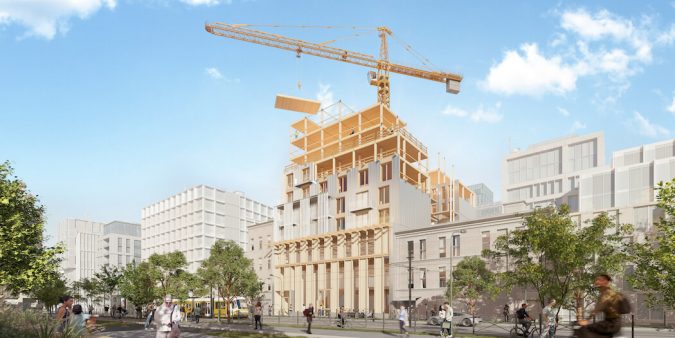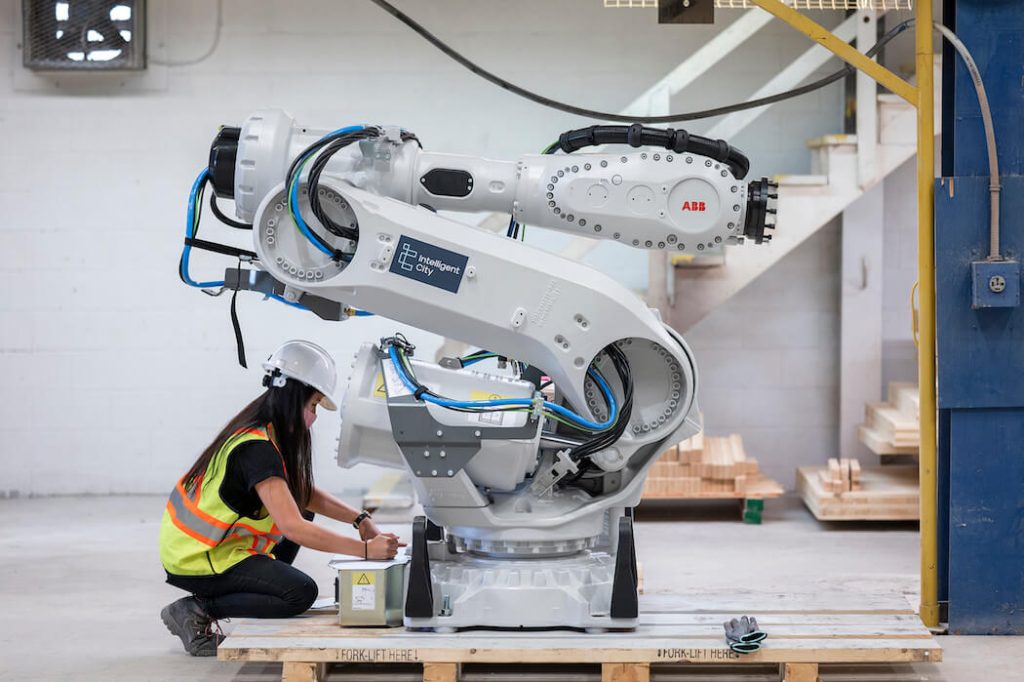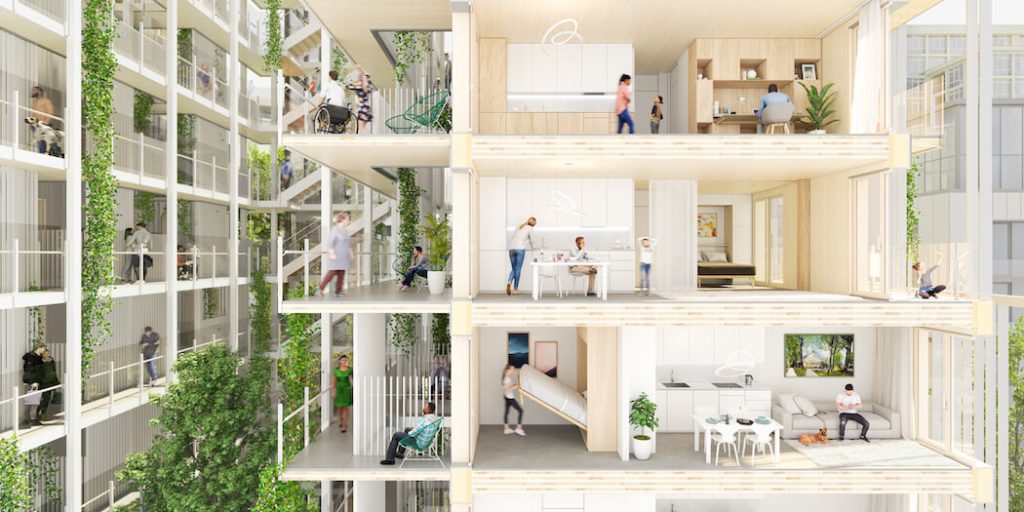
Intelligent City has secured $22 million CAD from investors like BDC.
Vancouver-based Intelligent City has been on a mission for the past decade to automate the construction of sustainable buildings.
The startup sits at the centre of cleantech, automated manufacturing, and sustainable prefabrication of buildings, all with the aim to make the urban housing construction industry more efficient and environmentally friendly.
“Now there is a realization that with companies like ours that there is this possibility to significantly change the needle.”
To that end, Intelligent City secured $22 million (all numbers CAD) over the past year in equity and grant funding. Its most recent Series A round of $12 million, which closed last month, will help the company build out its robotic manufacturing plants and scale into Ontario and along the West Coast of North America.
The Series A round was led by BDC Capital’s Cleantech Practice, and also included Greensoil PropTech Ventures, UIT Growth Equity GP, Fulmer & Company, which led Intelligent City’s seed round, and over 30 unnamed angel investors.
Intelligent City is also backed by $10 million in grants from government-funded bodies like the Natural Resources Canada (NRCan)’s Investments in Forest Industry Transformation program, the Sustainable Development Technology Canada (SDTC) Seed Fund, and the Next Generation Manufacturing Supercluster.
“I think maybe in the past people thought that it was a bit of a hopeless industry, that you can’t change, you can’t revolutionize and therefore investments weren’t going in that direction,” said Intelligent City co-founder and CEO Oliver Lang. “But now there is a realization that with companies like ours that there is this possibility to significantly change the needle.”
Lang helped to create Intelligent City in 2008, after more than 15 years in the architecture industry. He and his co-founder, Cindy Wilson (a fellow architect and designer), developed the company with the goal of creating mixed-use housing that combines high-quality livability, affordability, and advanced sustainability.
Lang sees Intelligent City among a small group of innovators in the construction industry that are focused on sustainability. It’s an industry that is known to be responsible for 39 percent of global energy-related carbon emissions.
 Intelligent City robots operating at manufacturing plant (Source Intelligent City).
Intelligent City robots operating at manufacturing plant (Source Intelligent City).
Intelligent City claims to offer sustainability and affordability through a three-pronged approach: a software platform that designs buildings, an automated manufacturing process, and the use of mass timber.
Timber may not sound innovative, but it’s considered a new category of construction that uses multiple solid wood panels that are layered, nailed, or glued together. It is said to be a low-carbon alternative to concrete and steel, and has risen in popularity in the United States and Canada over the last few years. Sidewalk Labs’ Quayside development, which never came to be, was set to be constructed using mass timber.
The mass timber model has been around since the early 2000s, first gaining traction in Europe. Last year, the United States group responsible for creating codes and standards for safe construction and design, the International Code Council, approved codes that allow for the development of mass timber buildings up to 18 stories.
This year, Canada updated its version of the National Building Code for the first time to allow for the construction of mass timber buildings up to 12 stories high. The change paved the way for Intelligent City to expedite construction of its buildings.
The startup is focused on creating buildings that are six to 18 stories tall. With a few buildings already constructed, Intelligent City is looking to increase its numbers specifically in Ontario and British Columbia, as well as on the West Coast of the United States.
The approval of mid-rise mass timber buildings has been much anticipated, and a variety of firms are looking to use the new construction model. But, Lang sees Intelligent City’s approach as unique given its combination of timber and technology. He called the company one of the first in the world to use robots in the manufacturing of prefabricated, timber buildings.
Lang argued that Intelligent City’s approach, combined with its software platform, allows the startup to scale its offering, creating buildings that meet building codes and standards across multiple jurisdictions while still allowing for customization.
He called the current construction model for these types of buildings “highly fragmented” and lacking innovation, focused only on bespoke buildings.
“It’s really one-off the buildings where every building is a custom project, a custom building, and there’s very little lessons learned from building to building and the industry is not working in particularly scalable ways,” said Lang. “So that’s something that we’ve really taken to heart.”
One example of this scale is the company’s plan to open a second manufacturing plant in Ontario in addition to its plant in British Columbia.
 Rendering of an Intelligent City building (Source Intelligent City).
Rendering of an Intelligent City building (Source Intelligent City).
The time seems to be right for Intelligent City, with new codes and capital to expand its go-to-market strategy. Lang explained that things started to take off for Intelligent City when it was chosen for NRCan’s Breakthrough Energy Solutions program in 2020: Intelligent City took home a $3 million grant as one of the top ten projects out of 22 finalists. Other winners included CarbonCure Technologies, Ekona Power, and eLeapPower.
Lang said that the grant, combined with additional seed funding raised around that time, allowed the company to triple its headcount, and outfit its manufacturing plant with robots and automation.
The Breakthrough Energy Solutions program was run in partnership with BDC and Breakthrough Energy, a group of high-net-worth investors established in 2015 by Bill Gates to address climate change. Lang said this gave Intelligent City the notoriety to attract more government grants and eventually venture funding.
Intelligent City’s total funding to date, between equity, debt, and grants sits at $30 million.
Intelligent City now has its eye on increasing market awareness of its product, alongside loftier goals of creating housing affordability, supporting climate change goals, and developing more urban-friendly housing.
“Our industry … is working in an environment right now, where we see almost never-ending cost escalation, and we’re getting nowhere near the mandates to meet the climate change issues that we need to as an industry,” said Lang. “So we need a fundamental change in the way we go about things.”
.